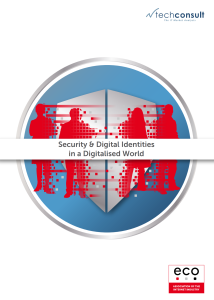A joint study by eco and techconsult shows potentials and obstacles in the use of digital identities
- Use of digital identities is growing by around 20 to 30 per cent annually
- Three out of four companies see the positive influence of digital identities on business performance
- E-government: Majority of citizens surveyed (60 per cent) want more online services and a greater degree of user-friendliness from public authorities (76 per cent)
- Universal digital identity is favoured above all by the majority of public authorities and companies
- eco Board Member Prof. Dr. Norbert Pohlmann: “In order to fully capitalise on the potential of digital identities, however, all stakeholders must participate in a sovereign, secure and trustworthy European ecosystem for identities.”
Companies, public authorities and citizens are all of the same opinion: electronic services based on a secure, single, digital identity are a core element of the future. This is the conclusion of the study “Security & Digital Identities in a Digitalised World”, which eco – Association of the Internet Industry has recently jointly published with techconsult. Within the framework of this study, 170 companies from all sectors and of all sizes, 40 public authorities and 300 citizens in Germany aged from 16 years were consulted on their assessments of digital identities. The results indicate great potential for the future use of digital identities, both for digital business models and for e-government services, but also highlight existing obstacles concerning legal issues and technical implementation. In particular, the provision of a single central digital identity planned by the EU and other regions is supported by a majority of users, but is still confronted with major security concerns. “A well-functioning infrastructure for digital identities is a key competitive and success factor for Germany as a digital location. In order to fully capitalise on the potential of digital identities, however, all stakeholders must participate in a sovereign, secure and trustworthy European ecosystem for identities,” says Prof. Dr. Norbert Pohlmann, eco Board Member for IT Security.
Great potential: use of digital identities growing by around 20 to 30 per cent annually
The ever-increasing digitalisation in all areas of life is making secure electronic identification indispensable vis-apublic authorities and private companies on the Internet. Digital identities are already being frequently availed of, especially by large companies and public authorities: 52 per cent of the companies surveyed already use technologies for unambiguous identification vis-à-vis customers. For instance, SIM cards can be activated at telecommunication providers via online ID, payments can be made via e-commerce, or security accounts can be opened at credit institutions via digital identity. Identification technologies are used by 59 per cent of the companies for their own employees. In the future, at least three quarters of the companies plan to use technologies for electronic identification. This corresponds to an increase in use of almost 20 to 30 per cent. Around three out of four companies (73 per cent) already see a direct influence of digital identities on their business performance. Every third company surveyed even attests to the essential importance of secure digital identities for future digital business models.
E-government: The majority of citizens surveyed (60 per cent) would like to see more online services and a greater degree of user-friendliness from public authorities (76 per cent).
Public administration bodies are already far ahead of companies in offering services based on digital identities, such as the eID. More than half of the municipalities have services that can be used by citizens as well as companies. These include, for example, digital administrative services with the online ID card, digitally operable vehicle registrations, or the paperless submission of tax returns (e.g., the German electronic tax declaration ELSTER). The availability of services will grow even more in the future. In moving ahead, nearly 28 per cent of the municipalities that do not yet offer digital citizen services are planning to introduce initial services.
The results of the citizens’ survey also show that services based on electronic identities have great potential. Almost two thirds of the citizens surveyed have already used digital services from banks and insurance companies. In addition, more than half of the citizens have used services based on a digital identity in the area of e-commerce. Moreover, just under a third have already used mobility services, e.g., for train tickets or charging stations, whereas public authority services have so far only been used by just under 30 per cent of citizens. In principle, citizens would consider using services based on digital identities in many fields in the future, assuming these services were also widely available. Especially in the area of e-government, the majority of respondents (60 per cent) would like to see more online services and better user-friendliness (76 per cent) from public authorities. For example, 55 per cent of citizens would use e-government services to carry out their administrative procedures digitally instead of on location. A further 55 per cent would use mobility services. In turn, 42 per cent can also envisage using digital health services.
Universal digital identity favoured above all by the majority of public authorities and companies
In particular, the introduction of a central digital identity, as planned by the EU and other regions, is supported by many users. One third of citizens currently have to manage more than ten different user accounts for the use of Internet services. One in ten even have more than 20 user accounts. A single, universally usable digital identity could replace this sprawling system and enable people to use a single identity to access the widest possible range of private and public services. According to the study, around 35 per cent of respondents would like to see a central digital identity to replace the numerous user accounts. Nine out of ten of the public authorities surveyed and more than half (55 per cent) of the companies also would like to have such central identities.
Challenges: User trust, as well as technical and legal issues
In order for digital identities to be used by citizens, there are certain obstacles that need to be overcome. Above all, citizens regard a lack of data protection or data security as a bottleneck that hinders the use of digital identities. Of the citizens surveyed, 46 per cent have this as number one on their top three list. This is followed by a lack of trust in the technology and the services behind it (35 per cent).
Companies (33 per cent) and public authorities (53 per cent) cited the various legal issues relating to digital identities as the main challenge. In total, 46 per cent of companies and 53 per cent of the public administration bodies would like legal advice on how to introduce identity-based services in a legally compliant manner. Technical advisory services are also high up on the wish list. On the part of both companies (46 per cent) and public administration bodies (45 per cent), almost half of the respondents need support on questions such as how to integrate the services into the existing IT infrastructure.
“Companies and public authorities should urgently examine the possibility of closing their own qualification gaps with the help of external providers,” says Raphael Napieralski, Analyst at techconsult. Only companies and public authorities that “close their gaps and make secure digital identities a core aspect of their future business strategy will be able to successfully continue the implementation of their digital business models in the future,” Napieralski adds.
The complete study is available for download.




